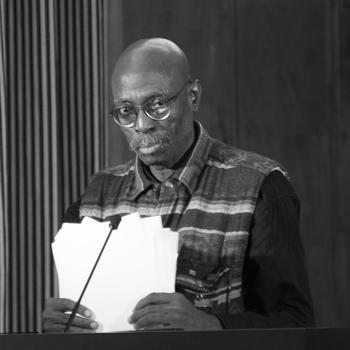Biodun Jeyifo

Interweaving Performance Cultures
Fellow 2013/14, 2014/15, 2015/16
Biodun Jeyifo is Professor of African and African American Studies and of Literature and Comparative Literature at Harvard University, USA. He taught at Cornell University as Professor of English, at Oberlin College, at the University of Ibadan and at the University of Ife in his native Nigeria. As a leading literary critic and cultural theorist who had attained great prominence in African intellectual circles for his analysis of modernity and its attendant social and cultural crises, he works on the complex connections between literature, critical theory, radical humanities scholarship and twentieth century progressive and revolutionary social philosophy.
His 1984 study of the Yoruba Popular Travelling Theatre is viewed by many as seminal in the study of African drama. Jeyifo’s early essays shaped critical discourse on dramatic works by Soyinka, winner of the 1986 Nobel Prize in Literature. Editor of the authoritative anthology ‘Modern African Drama’ (Norton Critical Editions, 2002), his works have long framed scholarship in African drama and theatre. His most recent book-length publication, Wole Soyinka: Politics, Poetics, and Postcolonialism (Cambridge University Press, 2004), won one of the American Library Association’s Outstanding Academic Titles (OATS) awards for 2005.
Research Project
Evolution and Revolution in African and Postcolonial Drama and Theatre
The main object of my fellowship would be to make final revisions on the following scattered essays for publication as a volume on writing, performance and scholarship on African and postcolonial drama and theatre in the last half century.
1. “The Invention of Theatrical Tradition” was a vigorous review of how African theatre scholarship transcended the great ‘inaugurating’ divide between the counter-discourses of Eurocentric and Afrocentric claims and counter claims.
2. “Drama, Globalization and the Challenge of Internal Otherness” looked at how both positive and negative “otherness” has profoundly shaped the evolution of African drama from the late colonial period to the present age of globalization.
3. “Whose Africa, Whose Theatre: Soyinka’s The Road on the Road” was a critical analysis of the widely divergent contexts for the reception of Wole Soyinka’s play, The Road, in three diverse and memorable productions in India (Mysore), the Caribbean (Port of Spain, Trinidad) and the United Kingdom (London).
4. “Ritual, Anti-Ritual and the Festival Complex: the Forms and Formations of Modern African Drama” was a critique of the over-valorization by scholars and critics of African theatre of the use of ritual as an authenticating formal technique in modern African literary drama.
5. “Catachresis and Being Relationally Anglophone – from James Ene Henshaw to Brian Friel” was a critical investigation into the forms and varieties of the use of English as linguistic medium and stage language in the works of four postcolonial Anglophone playwrights, James Ene Henshaw, Wole Soyinka, Derek Walcott and Brian Friel.
6. “Drama in/of Nollywood: the Reprise of the Onitsha Market Chapbook Tradition” was a review of the newly emergent “naïve” tradition of dramatic writing in and for Nollywood, the Nigerian video film industry, focusing on how constitutively “bad” writing leads to a rediscovery of melodrama, the quintessential mode of popular theatre and drama everywhere in the modern world.
Selected Publications
- B. Jeyifo, Wole Soyinka: Politics, Poetics and Postcolonialism. Cambridge: Cambridge University Press, 2005.
- B. Jeyifo, "Ayan Contra Ujamaa: Soyinka and Ngugi as Theatre Theorists", in: African Theatre, 17, 2014.
